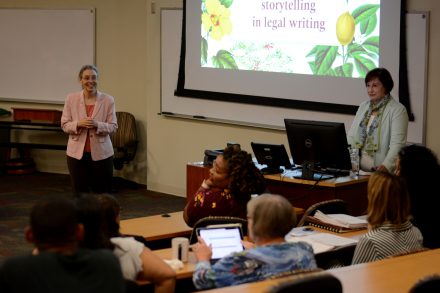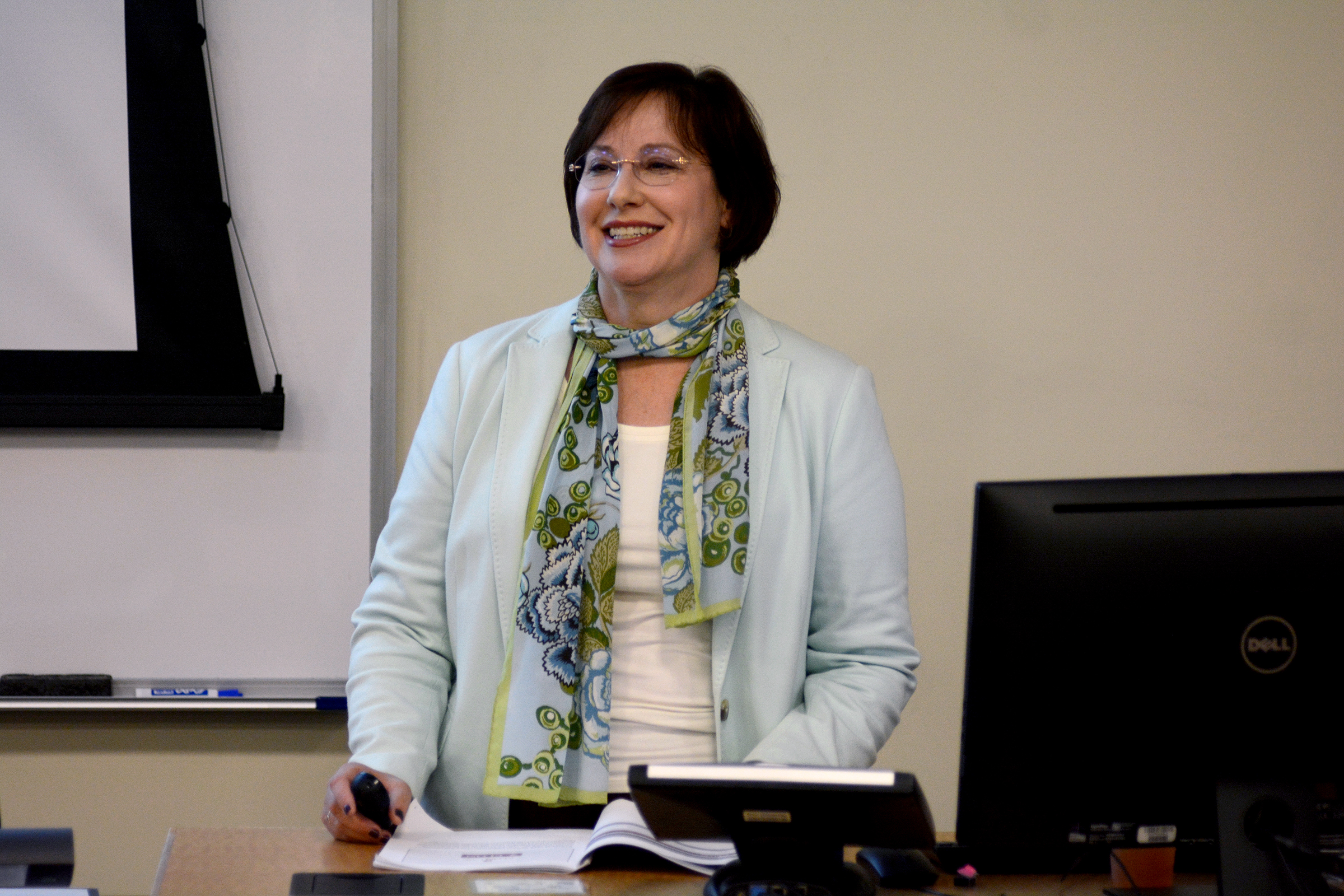A grant from the Association of Legal Writing Directors supported the two-day visit by Ruth Anne Robbins, a distinguished clinical professor from Rutgers Law who taught Elon Law students, faculty, and staff about the power of narrative storytelling and the importance of document design in the legal profession.
Lawyers often use what’s known as “narrative transportation” when recounting the facts of a situation: they describe the characters, actions, and settings of a client’s story.
The best lawyers do this in a way that helps the reader of a legal brief, or a juror in a courtroom, understand a sequence of events through the viewpoint and the values of that client, according to one of the nation’s leading experts on legal writing and communication.
That means using active verbs and precise details to inform audiences: to simply state “she was cooking” does little compared to “the pot simmered on the stove,” or using the word “tree” when that could describe anything from a towering oak to a potted bonsai. Specificity matters.
“When we process facts, as lawyers, we’re collecting facts, we’re assessing facts, we’re selecting facts – but then we’re telling facts,” Professor Ruth Anne Robbins from Rutgers Law School Robbins said in her discussion on storytelling in legal writing. “And it’s the telling that really can transform our readers’ minds. The act of storytelling is the act of describing a character’s efforts over time to reach a goal.
“The points that really matter are the description, the passage of time, and the character’s actions moving toward something.”
Robbins visited Elon Law from Sept. 23-24 as a visiting scholar whose three presentations to students, faculty and staff were supported through a grant from the Association of Legal Writing Directors. She emphasized the importance of narrative transportation by reminding one audience that good movies – especially horror flicks – do the same thing: they place the viewer into a different world.
“You’re in the theater, the music is building, the suspense is building, you’re getting anxious because you know something is going to happen, and then it happens, and you jump,” she explained in her talk. “But you you weren’t in the story! That’s happening on the big screen. You were safe in your seats! And yet you had a parasympathetic response because you are inside the story world.
“The best storytellers can drop their readers inside a story world to see what’s going on, to adopt the morality, the belief system, the judgments of the characters – and to be persuaded. It really matters.”
In addition to her Harry Potter-themed presentation on narrative transportation and storytelling in legal documents, Robbins shared tips with another audience that gathered to learn about effective document design. Among her key points:
- Don’t use all caps in headlines or section titles; bold face is more effective and doesn’t slow the reader.
- Make gray (not black) the elements of a document that “you only want to see when you want to see it,” like bullet points and page numbers.
- Though research is not definitive, Robbins said, serif fonts make for faster reading. However, because overhead projectors in classrooms and boardrooms often lose resolution, PowerPoint presentations should only use sans serif fonts.
- Save trees. Don’t double space a document when using 1.1 to 1.4 spacing makes reading easier while reducing the amount of paper used by printing a file.

“A well-designed document gets you pretty far, pretty fast simply because it looks easy to get into,” Robbins said. “The more we’re willing to read it, the more substance we’ll glean from it.”
The Association of Legal Writing Directors created its Visiting Scholar Program as the discipline of legal writing started to develop a more prominent role in legal education.
Robbins is co-editor in chief of “Legal Communication & Rhetoric: JALWD” and co-founder of the international biennial conference series, “Applied Legal Storytelling.” She served as the President of the Legal Writing Institute from 2008-10 and on its Board of Directors from 2004 through 2016.
“Professor Robbins enriched our legal writing curriculum by sharing her expertise so generously and creatively,” said Elon Law Professor Sue Liemer, director of the law school’s Legal Method and Communication Program. “The students and professors alike were able to use what they learned immediately, in class and in their own documents.”
Elon Law is one of just three law schools to host an ALWD Visiting Scholar in 2019-20, along with the University of Oregon and the University of Houston Law Center.
About Elon Law:
Elon University School of Law in Greensboro, North Carolina, is the preeminent school for engaged and experiential learning in law. With a focus on learning by doing, it integrates traditional classroom instruction with course-connected, full-time residencies-in-practice in a logically sequenced program of transformational professional preparation. Elon Law’s groundbreaking approach is accomplished in 2.5 years, which provides distinctive value by lowering tuition and permitting graduates early entry into their legal careers.



